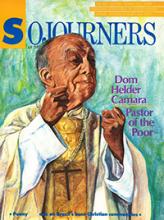Every year, as we on the Sojourners editorial staff sit around picking our brains, trying to I come up with burning issues on which to editorialize in our December issue, some hapless comedian suggests an editorial on the importance of "putting Christ back into Xmas." And, every year, we all look down our noses and laugh, considering the topic more befitting a church bulletin than our own "serious" journal.
But in fact, it is to that very topic that we devote our entire December issue every year. While so many of those around us mark the holiday thinking only of extravagant spending sprees and Santa Claus, we try to remember that the real reason for celebration is no less than the incarnation of God in human history.
While that incarnation occurred very dramatically and precisely with the birth of a baby in a Bethlehem stable many years ago, we believe incarnation is more than a single, historical event. For if Jesus made the church his body and called Christians to live as though God's Spirit lived within them, surely wherever there are faithful Christians the gift of incarnation is made real.
So, for several years, it has been our tradition to feature in our December issue a particular person or group of people who has given flesh to the way of Christ in this world and whose lives speak to us of the hope and joy of Christmas. In years past we have focused on the life and work of Dorothy Day, Thomas Merton, Fannie Lou Hamer, Clarence Jordan, St. Francis of Assisi, A.J. Muste, Sojourner Truth, William Stringfellow, and others.
This year we have chosen to celebrate the incarnational life of Dom Helder Camara, the retired Catholic archbishop of Recife and Olinda in northeast Brazil. Now almost 79 years old, Dom Helder remains a shining example of Christ's love and a tireless worker for a church and a world that would follow Christ's way of justice, peace, and nonviolence.
Read the Full Article

